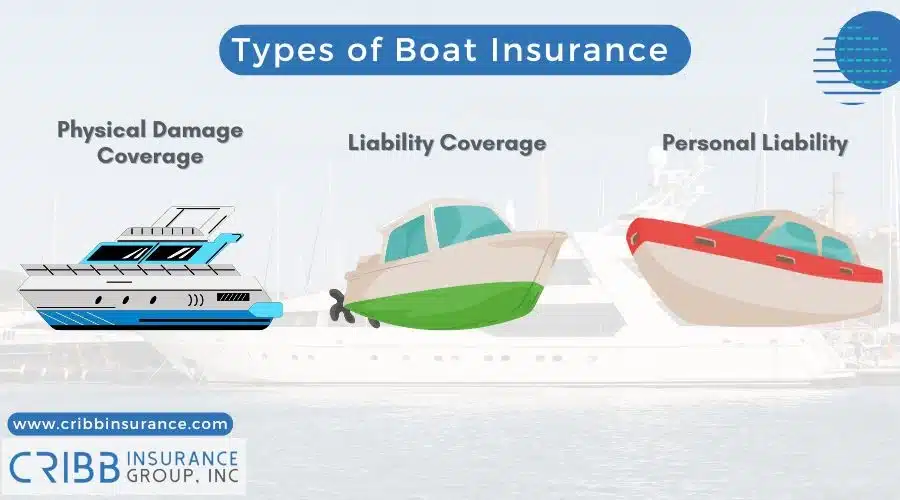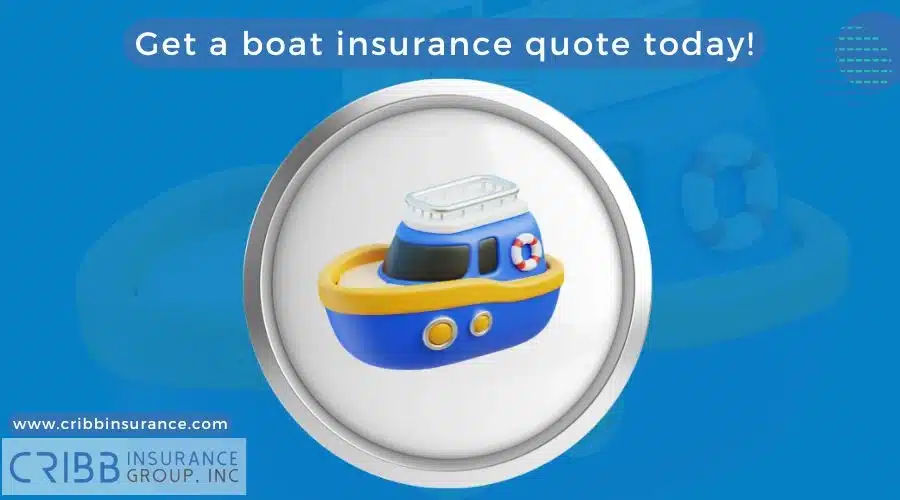Renting out your boat can be a great way to earn extra income, but it comes with risks. Accidents, damage, theft, and legal issues are all things that could happen while someone is using your boat. This is why boat rental insurance is so important. You want to make sure both you and your boat are protected in case something goes wrong.

What Insurance Do I Need to Rent Out My Boat?
When renting out your boat, you’ll need coverage that protects you, your boat, and the people using it. The key types of boat rental insurance you should consider include:
- Liability Coverage: Protects against damage to other boats, docks, or people.
- Collision Coverage: Pays for damage to your boat if it collides with something. According to the BoatUS 2020 Marine Insurance Claim Study, collisions with other boats or objects account for 26% of all boat insurance claims, making liability and collision coverage crucial for protecting your boat during rentals.
- Comprehensive Coverage: Covers non-collision damage, like theft or vandalism.
Understanding Boat Rental Insurance Options
There are several boat rental insurance options to consider, depending on how often you rent out your boat and the kind of coverage you need. Here are some of the most common options:
- Short-term boat rental insurance: Ideal if you only rent out your boat occasionally.
- Peer-to-peer boat rental insurance: This is similar to platforms like Airbnb, where you can rent your boat to individuals. You’ll need specific coverage that applies during the rental period.
- Comprehensive boat rental insurance: Provides broad protection for frequent rentals, including liability and damage coverage.
Boat Insurance Coverage: What’s Included and What’s Not
Before you rent out your boat, it’s important to understand what boat rental insurance covers and what it doesn’t. Here’s a breakdown:
What’s Included:
- Liability coverage: If your boat causes damage to another boat or property, this will cover the costs.
- Collision coverage: Protects your boat if it hits something, such as another boat or a dock.
- Comprehensive coverage: Covers things like theft, vandalism, and weather-related damage.
What’s Not Covered:
- Damage from improper use: If the renter misuses the boat, certain claims might be denied.
- General wear and tear: Normal aging of the boat is not covered.
- Racing or commercial activities: If the boat is used for races or business without the right coverage, you might not be protected.
Legal Requirements for Boat Rental Insurance by State
Boat rental insurance laws vary depending on the state. In some states, boat insurance is required by law, while in others, it’s not. However, even if it’s not mandatory, having coverage is strongly recommended to avoid financial risks.
For example:
- Florida: Requires boat renters to have insurance under new state laws.
- California: Does not require boat insurance by law but highly recommends coverage to avoid liability risks.
- New York: Similar to California, insurance isn’t legally required, but it’s encouraged for rentals on large water bodies like lakes.
Since laws differ greatly, make sure you understand the regulations where you plan to rent out your boat. Not having the right coverage could lead to penalties or denied claims.
How Boat Insurance Works and Common Insurance Terms
To ensure you’re fully covered, it’s important to understand how boat rental insurance works. Here are some key terms you’ll encounter:
- Deductible: This is the amount you pay out of pocket before insurance takes over. For example, if your deductible is $500 and the damage costs $2,000, you’ll pay $500, and insurance will cover the remaining $1,500.
- Limits: This is the maximum your policy will pay for a covered loss. For instance, if your policy has a $100,000 limit, that’s the most the insurance will pay for damage or liability, regardless of the total cost.
- Exclusions: These are situations where your insurance won’t provide coverage. Common exclusions include activities like racing, nighttime boating, or damage caused by specific weather conditions.
Factors That Affect Boat Rental Insurance Premiums
Several factors determine how much you’ll pay for boat rental insurance. Knowing what affects your premiums can help you choose the right coverage while managing costs. Here are some of the main factors:
- Boat size and type: Larger boats or those with powerful engines may cost more to insure.
- Boat age and condition: Older boats or those with a damage history may lead to higher premiums.
- Usage frequency: If you rent out your boat often, your premium may be higher due to the increased risk.
- Location: Areas with higher rates of accidents or theft can result in higher insurance costs.
- Boating experience: If the renter or owner has little experience, this can also raise premiums.
Renter Screening Guide: Key Steps to Minimize Risk
Before renting out your boat, it’s important to screen your renters to reduce the risk of accidents and damage. Follow this simple step-by-step guide:
- Check the Renter’s Boating Experience: Ensure the renter has enough experience to safely operate your boat. Request proof of a boating license or certification if applicable.
- Verify Insurance Coverage: Check if the renter has any insurance that might cover boat rentals or liability.
- Set Clear Guidelines: Provide the renter with safety rules and operating instructions for your boat.
- Require a Security Deposit: You should request a security deposit to cover any minor damages that may occur during the rental period.

Add-Ons and Optional Coverages: Should You Consider Them?
In addition to standard boat rental insurance, there are several optional coverages you may want to consider, especially if you rent out your boat frequently or own expensive equipment:
- Equipment Coverage: Protects expensive gear like fishing equipment, water skis, or other onboard tools.
- Towing Coverage: Assists if the boat breaks down during a rental and requires towing.
- Personal Effects Coverage: Covers the loss or damage of personal items (e.g., phones, cameras) brought aboard by renters.
By adding these coverages, you can protect both your investment and the renter’s personal property.
Comparing Boat Rental Insurance Providers
When choosing a boat rental insurance provider, comparing coverage, cost, and benefits is important. Below is a comparison of top providers:
| Provider | Coverage Types | Special Features | Cost Estimate |
| BoatUS | Liability, Collision, Comprehensive | Broad coverage for boat owners and renters | $300-$700 annually |
| Geico | Liability, Comprehensive | Competitive rates, multi-policy discounts | $350-$800 annually |
| Tivly | Peer-to-peer, Short-term | Specializes in rental platforms like Airbnb | $400-$1,000 annually |
These providers offer a variety of options, so compare features to see which one best suits your needs.
What Size Boat Needs Insurance? Understanding Coverage Needs
Not every boat requires insurance, but you’ll definitely need it when renting out larger vessels. So, what size boat needs insurance?
Typically, boats over 26 feet in length are more likely to require coverage. Insurance is often optional for smaller vessels, such as kayaks or canoes. However, it’s highly recommended—and sometimes legally required — for larger boats like powerboats or sailboats.
If you’re renting out a larger boat, boat rental insurance coverage will protect you from major expenses if something goes wrong. Ensure your policy covers the right size and type of boat to avoid any gaps in protection.
How Much Coverage Should You Have for Your Rental Boat?
Choosing the right amount of coverage is essential to avoid being underinsured or paying for unnecessary coverage. Here’s how you can determine how much insurance coverage you need:
- Liability Coverage: A good rule of thumb is to have at least $300,000 in liability coverage to protect against damage to other boats or property.
- Collision Coverage: Make sure the coverage is enough to repair or replace your boat in case of an accident.
- Comprehensive Coverage: Include enough to cover your boat against theft, vandalism, and natural disasters.
When deciding how much coverage you should have on a boat, it’s important to consider the risks, your boat’s value, and local legal requirements. You can avoid costly mistakes by matching your coverage to your boat’s value and usage.
Common Claims Related to Boat Rentals: Be Prepared
When renting out your boat, you need to be prepared for common insurance claims. Here are the most frequent claims made by boat owners:
- Collision with other boats or docks: One of the most common incidents, especially with inexperienced renters.
- Damage from weather: Storms, wind, and even extreme heat can cause damage to your boat while it’s rented out.
- Theft of the boat or equipment: This includes not only the boat itself but also expensive gear on board.
- Accidents involving passengers: These might include injuries from falling overboard or being hit by the propeller.
Having the right boat rental insurance coverage protects you from these common scenarios. Knowing what claims might arise will help you prepare for and avoid costly situations.

Best Boat Rental Insurance Providers for Peace of Mind
Finding the best boat rental insurance provider ensures you’re covered. Here are some top providers:
- BoatUS: Known for offering comprehensive coverage for boat owners and renters, including liability and collision.
- Geico: Provides solid boat insurance options, often at competitive rates, with coverage for damage and liability.
- Tivly: Specializes in boat rental insurance options, including coverage for peer-to-peer rentals and short-term insurance.
Steps to Take Before Renting Out Your Boat
Before you rent out your boat, there are a few key steps you should take to ensure your boat is safe and your insurance is in place:
- Perform a safety inspection: Make sure your boat is in top condition and that all safety equipment is on board.
- Verify insurance coverage: Double-check that your insurance policy covers boat rentals and that the renter knows any limitations.
- Create a renter’s manual: Include basic operating instructions, emergency contacts, and safety procedures for the renter to follow.
- Sign a rental agreement: This should outline the rental terms, including who is responsible for damages or violations of the rental terms.
By following these steps, you can minimize risks and ensure that both you and your renters are protected.
How to File an Insurance Claim for Your Rental Boat
You must know how to file an insurance claim if something goes wrong during a rental. Follow these steps to make the process smoother:
- Document the damage or incident: Take clear photos and describe what happened, including the time, place, and any witnesses.
- Contact your insurance provider: Report the incident as soon as possible. Be ready to provide details and the documentation you gathered.
- File the necessary forms: Your insurer will guide you through filling out the claim forms. Ensure all required information is accurate.
- Work with the adjuster: An insurance adjuster may inspect the boat and assess the damage before the claim is approved.
- Receive payment: Once the claim is processed and approved, the insurer will issue payment based on your policy terms.
Protect Your Boat and Rental Business with Insurance
Renting out your boat can be a great way to make extra income, but it’s important to be protected. The right boat rental insurance can save you from unexpected expenses and legal issues. Whether you need short-term boat rental insurance or comprehensive coverage, investing in a policy that covers your boat, you, and your renters is crucial.
At Cribb Insurance Group Inc, we’re committed to helping you find the best boat rental insurance options tailored to your needs. By following the guidelines in this article, you’ll understand exactly what insurance you need to rent out your boat and how to choose the best option. With the right protection from Cribb Insurance Group Inc, you can rent your boat with peace of mind.
Frequently Asked Questions
Do I need insurance when renting out my boat?
Yes, regular boat insurance typically doesn’t cover rentals, so you’ll need specific boat rental insurance.
Does my standard boat insurance cover rentals?
Most standard boat insurance policies do not cover rental activities. You’ll need a specific boat rental insurance policy to protect your boat, renters, and yourself.
Can I get insurance for just a single-day rental?
Yes, many insurers offer short-term or one-day boat rental insurance for those who rent their boats occasionally. This is a great option for owners who only rent out their boats a few times a year.
Does boat rental insurance cover damage caused by renters?
Yes, boat rental insurance typically covers damage caused by renters, including physical damage to the boat, liability for bodily injuries, and legal expenses in case of a lawsuit.
What happens if my boat gets stolen during a rental period?
Boat rental insurance often covers theft, but the specifics depend on your policy. It’s crucial to confirm that your insurance includes coverage for theft during rental periods.
Get Your Boat Rental Insurance Quote Today
Protect your boat and rental business before an accident happens. Cribb Insurance Group Inc offers expert advice and customized boat rental insurance policies. Compare your options and find the best coverage today with Cribb Insurance Group Inc. Call us at (479) 286-1066 to get started!





